Gerry Adams's Blog, page 41
August 31, 2017
Our Children's Voice
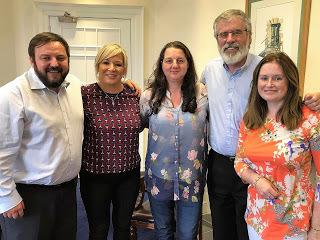
Padraig MacLochlainn; Michelle O'Neill; Gina Grant; Gerry Adams; Aisling Nibbs
Many, many years I heard Father Alec Reid say 'There is no blessing like the blessing of a healthy child'. When I first heard him say this I was under-impressed. It was such a patently obvious observation. Usually when he made this remark we would be in the company of a new baby or some boisterous youngster. Or youngsters. Full of energy and life and potential.
Then as I got older and met children with life limiting ailments and disabilities and their parents or carers I came to reflect on the Sagart's remarks. Fr. Alec was right. There is no blessing like the blessing of a healthy child. Imagine having to cope with the heartbreak of a child with a terminal illness? Or a child with profound disabilities?
This is the challenge facing many parents. Terminal illness is perhaps the most difficult and emotional crisis to confront families. It is difficult enough if this is an adult. But it is especially demanding when the person who is ill is a child.As an activist and particularly as a public representative I have been honoured to meet many carers over a very long time. I'm sure all public representatives have the same experience whether they are TDs, MPs, MLAs or MEPs. Whether they are unionists or the rest of us. It is particularly moving to meet the parents or grandparents of children who are grievously ill. It is also an absolute imperative that we help to shape society to give them the supports they deserve. That means a rights based society.
During the Stormont negotiations in June, at my request, Ashling Nibbs and Gina Grant of the Donegal based parent-led campaign group “Our Children’s Voice”, made the long journey to Stormont Castle to meet Michelle O’Neill and me. The two parents were accompanied by Senator Padraig Mac Lochlainn. This was my second meeting with them.
Michelle and I had agreed to meet them to explore how an all-Ireland/cross border solution could be put in place to ease the distressing trauma faced by desperately ill children in Donegal who urgently need palliative care and treatment for life limiting conditions. They and their families must travel approximately 140 miles to access treatment and care.
Ashling and Gina explained to us how they have been campaigning for over three years for the level of care that their children need and deserve. Their very personal and harrowing accounts of the distress they and their children have had to endure was upsetting.
The two very brave mothers spoke about how they are forced to bring their very sick children to Dublin to access end of life care, palliative care and respite care.
Ashling told us about the ordeal experienced by her eight year old son Oran who faced eight hour round trips in order to access chemotherapy while seriously unwell and immobile. Imagine how much these gruelling journeys must have drained Oran of the energy he so badly needed in his fight for life? Sadly, Oran has since passed away. Since 2014 when the campaign group was established four children have died.
The parents expressed their anger at the lack of facilities closer to their homes and the physical and emotional strain that the long journey create for them and their children. Michelle and I heard of the indignity one family endured. They had to transport their child's body for over 4 hours home and then a further ferry trip to the islands.The only respite services currently available to these children are accessed via referral to Laura Lynn Children’s Hospice, based in Dublin. Families may be offered fifteen nights per year, in blocks of two or three night stays. In many cases, the travel outweighs the benefit of respite for children and families. So they go without.
The absence of such services closer to Donegal is an injustice. It is unacceptable that extremely sick children must undertake such lengthy and tiring trips to access vital care and treatment. Children's Palliative and End of Life care should not be determined by geography. Not in a modern wealthy society. Not anywhere.
The reality is that the parents of ‘Our Children’s Voice’ shouldn’t have to protest, lobby or fight to secure the right of their children to have proper access to the required standard of care. But they have to. They have to become activists and campaigners because they have been failed by the state. They have been punished by the marginalising policies implemented by successive governments.
A central objective of Our Children's Voice campaign is for children in Donegal to have access to necessary respite/palliative /hospice care closer to home. That includes the possibility of services within the North as an alternative to having to travel to Dublin. There is obvious potential for an all-island approach to this problem.
When Michelle O’Neill was Minister for Health in the North, she launched a ten year strategy for children’s palliative and end of life care (2016-2026). This strategy provides for extending Paediatric networks outside of the north to explore access to specialised services on an all-island basis.
Sinn Féin has consistently advocated for healthcare to be developed on an all-island basis. In fairness other parties have acted on this imperative as well, including the DUP's Edwin Poots. They recognise the mutual benefits of such a policy. The provision of cancer services at Altnagelvin Hospital in Derry for the whole of the north west of the island is a model that works. It makes sense. There are healthcare benefits for all. And ultimately and potentially for the children represented by ‘Our Children’ Voice.’
The courage and bravery of Ashling and Gina and the other parents is amazing. Their tenacity in the face of governmental failure to provide a necessary service is astonishing and uplifting. I believe all public representatives can and should support them. Since our meeting in June we have engaged with the Irish government, the HSE, and even in the absence of Northern Assembly, with the departments and bodies in the North. There is an urgent need to put in place a system of care that is compassionate and effective and meets the needs of terminally ill children and their families. A severely ill child should not be forced to travel such distances to receive the care they need.
Not if we are really serious about cherishing all our children. Equally.
Published on August 31, 2017 11:21
August 27, 2017
Jimmy
Once upon a time I was in prison. Truth to tell I was in prison a few times. That experience stays with you. Even now I occasionally have the sense of being a lapsed prisoner. Though not in any serious way. I suppose I say that only because I think it is a funny thing to say. I don't seriously believe I could end up back in prison. But never say never. We live in a funny old world. Anyway prison never did me any harm. I met many interesting people there. Some of them were prisoners. Some were prison officers. Some of the ones who were prisoners were Trusties. ODCs. Ordinary Decent Criminals. Jimmy was one of these. That's not his real name. The ODCs emptied the rubbish. Worked in the kitchen. Or the hospital. The ODCs wouldn't have much truck with us anyway. Especially the ones from loyalist neighbourhoods. Jimmy was a loyalist. Or at least that was his background. How do I know that I hear you ask. He told me so himself. The Ordinary Decent Criminals didn't consort much with republican political prisoners. Probably afraid to. Not that there were many points of contact between us anyway. Especially with the loyalists. By the way there were quite a few ODCs from nationalist neighbourhoods as well less I am accused of caricaturing loyalists. Jimmy worked with the prison doctor. I was over one day chancing my arm looking for a milk ration. Getting a milk diet was a good way of avoiding some of the worst of the prison food. Jimmy noted down my details. There was no one else in the waiting room. The Doctors was in a little wing of its own. A small cell. There was a slightly bigger one just beside where the doctor had his office. Jimmy and I were in the small cell. Just me and him. 'How you getting on?' I asked.He was a little bit surprised. Looking up from his folder - my folder - he asked ' Who me? You talking to me?''I don't see anybody else here.''Oh I'm dead on. Just not used to one of youse talking to one of us'. He looked around anxiously. ' I'm not of your sort. I dig with the other fut.''Good man' I replied 'what's your name?''Jimmy' he said ' and I know who you are.'I stuck my hand out. He shook it firmly. 'You smoke?' I asked. 'Yup' he said ' like a train. Nothing else to do in this kip'. I gave him a few cigarettes. He smiled warmly at me. 'Thanks mate. I appreciate that.' 'I'm giving them up' I said. 'Again.''Wait there' he ushered me into the bigger cell. 'the doctor will call you in a minute'. When I finished with the doctor and returned to the small cell Jimmy was gone. But I saw him again the following week. My milk ration had to be prescribed on a weekly basis. I didn't mind that. It got me out and about. Getting a ration of milk every day was a big deal. And getting out to the doctors was a break in the monotony of prison life. So was meeting Jimmy. He and I became friends. I would bring him a few fags. He would slip me a newspaper or a bar of chocolate. That might not sound like a big deal but when I was on punishment a square of Cadburys was a feast and getting a newspaper was like a visit to the library. Jimmy was also taking a chance giving me this stuff. He could have got into trouble. Loss of his privileges. Maybe even loss of remission. Me? I was in trouble anyway. On a Red Book. So it didn't really matter to me. Most of the time I was in with a bunch of other political prisoners. We looked after each other. We didn't have that much contact on a daily basis with the prison system. Or as I've mentioned, with the Trusties. That wouldn't be approved of. By the prison regime. Or maybe by our own ones as well. But as luck would have it Jimmy and me never got caught. These weekly encounters became part of our routine. We would only be together for a few minutes. Even less. But we liked chatting to each other. Jimmy chatted a lot. So after six months I knew he started his gaol career for stealing drugs from a chemist he worked for. He said he was pressured into doing it. That's how he got to work with the prison doctor. Because he used to work for a chemist. He said he was a young man at the time. Now Jimmy was married and had two kids. But since his first stint he was in and out of prison a good deal. Just for a few months or a year or so at a time. Nothing too big. Mostly bits and pieces of fraud. Once for assaulting a peeler. 'What type of loyalty is that? I scolded him. 'I'm also fond of a wee drink' he confessed to me. One day as we discussed his release. It was only a month off. 'Drinks a curse if it gets to you' he proclaimed. 'I'm gonna give it up'. 'Well' I said ' You have a lot going for you. A wife. Two babies. You gotta think of them'. 'That’s okay for you to say that. Your side has everything going for you'. He replied. I burst out laughing. 'Would you ever catch yourself on' I told him. 'I'm stuck in here. No charges. No trial. No release date. You're out next month. I'm sure there will be a wee rehabilitation job waiting for you. There is no reason for you ever to be back in here again. If you mind yourself. Remember if you can't do the time don't do the crime'.'That's not what I mean!' He retorted. 'You know that. I mean your side are getting everything that's going. All the oul shite about discrimination is paying off. You really think our side has all the good jobs and the nice houses? We have nothing. Not where I come from.''Well do something about it' I said. 'Don't blame me. I don't blame you. I don't believe in this two sides carry on. Who does that suit?'We left it at that. But when I was leaving a few minutes later he slipped me a packet of Polo mints. 'Your breath is stinking' he smiled. We parted on good terms. He, a few weeks later, out to East Belfast. Me back to solitary. I missed our weekly engagements. Then eventually I got out as well. Years later up at Stormont I was on my way into Martin McGuinness' office one day when a man detached himself from a group of visitors and hailed me. It was Jimmy. I was delighted to see him. He was delighted to see me. We shook hands warmly. 'You've come up in the world' he exclaimed.'So have you' I said.'I'm taxi-ing' he told me 'showing these French visitors around. Giving them the real history of our wee country. Will you get a photo with them? ''Sure' I agreed ' if you come in and say hullo to Martin'. So we did. Martin was as gracious as ever. I told him about me and Jimmy and our gaol soirées. Jimmy insisted on getting a photo with Martin. As he looked around his big office he turned to me. 'Didn't I tell you your side is getting everything that's going?' He laughed.'And didn't I tell you that I don't believe in this two sides nonsense. We disagree on things but we're all the one'. 'That’s my position too' Martin said. 'You won't be surprised to hear!' 'Ask my brother am I a liar? Jimmy smiled. 'Seriously Martin you're doing a great job with the peace process'. 'You never said that to me' I chided him. 'I get the credit' Martin laughed ' he gets the blame. Now if you two aul jailbirds get out of my office I'll get back to my work'. So we left him. Jimmy and I parted in the Great Hall. As he went out with his group he slipped me another packet of Polo mints. 'Your breath is still stinking' he told me. That was Jimmy. We arranged to meet again but we never got round to it for a while after I became a TD for Louth. Then he came down to Dublin for a Bruce Springsteen concert and I got him - Jimmy that is not Bruce - to come into the Dáil for lunch and we had a great session together. When we were parting he told me he hopes he never goes back to gaol again. I hope so too. Jimmy is a decent man. He has learned his lesson. If he does end up in clink again that would be a disaster. Especially if I was there as well.
Published on August 27, 2017 11:03
August 18, 2017
Féile an Phobail - Thirty Years a Growing
Thirty Years A Growing
I didn't get to any Féile events this year. That's a first. Truth is I was too tired. Martin's death. Two elections. Two USA trips in July. Constituency duties in the Dáil and in Louth. Talks or what passed for talks at Stormont. It all takes time and effort.
So I decided to forgo Féile this year. I missed a very wonderful series of events. I was particularly sore not to get to the RFJ's Plastic Bullet picket. Another first. But I followed it all on Twitter. Especially Clara Reilly. A mighty woman. Battling on. Never giving up. Emma Groves and Clara were never beaten. Never will be.
Féile is great. Taking a step back from it all is a very good way to appreciate how great it really is. So once again well done and thanks to Sam and Kevin and Angela and Harry Beag and all the women and men of the current brilliant, energetic and ever resourceful Féile team. That includes Ciaran Morrison who is leaving after 17 year of Féile adventures. And Ciaran eile who keeps us honest.
Back in the days before Féile An Phobail, West Belfast was a different country. Under military occupation. Censored. Community structures subjected to political vetting. Discrimination rampant. Everyone was related to or knew someone who was a political prisoner. Neighbours' sons and daughters. No state funding whatsoever for Irish language education. Little for Gaelic games. Neighbourhoods subjected to counter insurgency measures. Betrayed by church hierarchies and by the great and the good. Including Dublin. Especially Dublin. Community leaders and political representatives targeted by British State sponsored death squads.
Republican West Belfast was a community in rebellion. We still are. Back then we were deeply invested in a culture of resistance against occupation and oppression. Many of our battles were defensive. Underground. But we were in transition. Our culture of resistance was becoming a culture of change. Of reconquest. But there were too few platforms for this. The republican community of West Belfast was hemmed in. Under the cosh. Unbowed and unbroken. But needing an outlet for our positive energy and imagination. And vision.
The killings at Gibraltar of three outstanding West Belfast citizens Volunteers Mairead Farrell, Seán Savage and Dan McCann and especially the establishment's vile demonisation of their community- our community - was a tipping point. A lesser people could not have survived the decades of vicious insults, lies and invective. But this onslaught and the attacks on their funerals and the other funerals and deaths of Caoimhín Mac Brádaigh, Thomas Mc Erlean and John Murray which followed, including the two British soldiers, became a catalyst for that culture of change to find a platform. Féile An Phobail was a result of that. We were telling our detractors to f... off. We knew who we were. We were no better than anyone else. But we were no worse.
So Féile was our answer. Our alternative. It became the forum or forums for local artists, poets, photographers, singers, dramatists, dancers, painters, chancers, writers, talkers, sports people and spoofers to strut their stuff. To yell yahoo! In harmony. To give licence for hope and creativity and cheerfulness and positivity. To reclaim our space. To create space for others. To enjoy ourselves. To say this is who we are. Not a terrorist community. But a patriotic, resourceful, intelligent, cheerful, confident, caring and hopeful gathering of men and women looking to the future and prepared to imagine that that future could be fair and inclusive. And happy. Capable of making our own music. Of shaping and creating our own vision.
Féile was also an invite for other progressives to join us. And they did. Playwrights. Painters. Singers. Musicians. Actors. Actresses. Activists from other struggles. Other political views. Other traditions. Boy Bands and Girl Bands. Writers. Orchestras. Rap artists. Seán nós singers. Hip Hoppers. Rappers. Céili dancers. Movers and shakers. Stilt walkers. Discreet Walzers. Tango dancers. Talkers. Walkers. Citizens with disabilities. Old people. Children. Youth. Wannabe Youths. Cooks. Cranks. Fly boys from the love comics. Loose men. Delinquent pensioners. Dog lovers. Dogs. Glamorous Grannies.
Some are coming to Féile still. Now part of the Féile family. Marie Jones brought her plays. She nurtured a theatrical undercurrent which took its own communal stories and experiences and gave them dramatic form. Pam Brighton mentored local writers and stage designers and sound engineers. Citizens who were never in a theatre flocked to parish halls, local schools, community centres and GAA clubs to be uplifted and moved to tears or cheers. Field Day included the Féile in its tours. Stephen Rea brought Oscar to life. Ulick O Connor and the late Tomás MacAnna gave us Executions. Dan Gordon gave us A Night in November. The list is endless. A new generation of young artistes blossomed. They are still captivating us with their art. Local performers, writers. Bi lingual drama at its best. Communal tales with universal themes.
Robert Ballagh arrived to acknowledge the artistic beauty and integrity of our fledgling mural painters. Where previously the painting of political graffiti was liable to incur RUC harassment or worse no one could stop you painting a gable wall if the householder was content to have their gable transformed by Mo Chara or Danny D, Martie or their legions of fledgling Jim Fitzpatricks. And Jim came as well to praise their masterpieces.
So did Gerry Keenan with orchestras to beat the band. The Sky's The Limit opened for The Ulster Orchestra. Peadar O Riada brought An Cor Cullaigh. Eddie Keenan sang 'I Was There.' Seán Maguire enthralled us with his fiddle magic. Mícheál Ó Súilleabháin with his piano. Terry Enright brought us up the Black Mountain. The Falls Park hosted a Póc Fada. The Bobby Sands Cup challenged soccer teams. The Mairead Farrell Tournament did the same for Camogs. Aidan Creen and Terry Goldsmith opened up The Bog Meadows. Tom Hartley started his graveyard tours. Féile opened our own radio station. If we were blocked from other media why not start our own? Hector McNeill and Tea Pot footered at that for a while. Donnacha Rynne made his debut there. Fergus Ó’ Hír dabbled in Irish language radio broadcasting. Radio Fáilte was born. Ag fas fos.
Martin Sheen came to visit. And later Michael Moore. And many, many more. President Mary Robinson defied both the British and Irish governments and visited us with the active encouragement of Inez McCormack, Eileen Howell and other sisters. Mary McAleese, no stranger, was later to make the same journey also as President.
And those who censored us? We reached out to them and invited them to talk and to listen to us. We welcomed detractors and other naysayers along with ordinary decent citizens to West Belfast Talks Back. Discussion groups, debates and lectures flourished under the leaderships of Jake Jackson, Paddy Kelly, Majella McCloskey, Siobhan O Hanlon, Carol Jackson, Bill Rolston, Danny Morrison and Jim Gibney. Danny also pioneered Scribes at The Rock and the odd time in The West Club, and brought authors from far and near.
Exhibitions blossomed everywhere. Quilts. Photos. Posters. Drawings. Paintings. Sculptures. H Block Comms. The West Belfast Film Festival brought Stephen Fry to visit. He was amazed at the grey threatening awfulness of the Barracks opposite Milltown Cemetery and delighted by the welcome he got in McAneany's. Seamus Heaney came as well. His first time back in St Thomas's since he taught there. A memorable day with Jimmy Ellis at Sam Thompson's graveside in the City Cemetery and later in St Mary's.
And singing? We sang like angels. With Planxty. Anúna. Frances Black. Mary Black. The Bueno Vista Social Club. The Wolfe Tones. Bríd Keenan. Altan. Brian Kennedy. Shane Magowan. Davy Spillane. Dolores Keane. Mick Hanley. Jimmy Yamaha. A Welsh miners choir. Brush Shiels. Jimmy McCarthy, Fra McCann. Floyd Westerman. St Agnes Choral Society. Tony McMahon and Noel Hill. Christy. UB40. Brian Moore. Noírín Ní Riain. Tony Carlisle, Flair, Jim Moody became friends of the stars. High flyers.
For years we survived without funding. Our leaders included Deirdre McManus, Siobhán, Danny Power, Seán Paul O Hare, Geordie Murdoch, Caitriona Ruane, Niamh Flanagan, Geraldine McAteer, Ciaran Quinn, Aidan McAteer, Ciaran Kearney, Deirdre Mackle, Margaret McKernan, Deirdre Walsh and Maura Brown. And countless others. Many worked in a voluntary capacity. The Andersonstown News was always an ally. And the local Irish language community. And Springhill the main concert venue for years. Right in the centre of the war zone. No one else would have done it with such panache.
Now the Féile is Irelands foremost community festival. Despite the best efforts of those who lorded it over us thirty years ago. I am sure the history of this all will be chronicled. It needs to be. Memory is important. So too is the telling of our own stories. That's what Féile is about. Writing the future while righting the past.
But the arts needs proper dedicated core funding. Local sponsors have kept faith. We are grateful to them but the Féile team survives on a shoe string. Could it be better? Of course. But almost 30 years later Féile is still one of the best things I was ever involved with. It's success is a great credit to everyone who was or is associated in any way with this outstanding communal celebration. Not all the names are included here. That is not intentional. So if you're left out or if you know somebody who is left out shout! This is only my flawed hurried little recollection. Write your own. Send it to Andytown News. Or the Féile office. With photos if you have them.
Maybe as we celebrate thirty years a growing some of us will find the time to write a list of all the Féile leaders and champions and do a Féile Thirty Years On Birthday ReUnion. Just to remember and say Go raibh mile Maith agaibh go leir.
An Féile Abú!
I didn't get to any Féile events this year. That's a first. Truth is I was too tired. Martin's death. Two elections. Two USA trips in July. Constituency duties in the Dáil and in Louth. Talks or what passed for talks at Stormont. It all takes time and effort.
So I decided to forgo Féile this year. I missed a very wonderful series of events. I was particularly sore not to get to the RFJ's Plastic Bullet picket. Another first. But I followed it all on Twitter. Especially Clara Reilly. A mighty woman. Battling on. Never giving up. Emma Groves and Clara were never beaten. Never will be.
Féile is great. Taking a step back from it all is a very good way to appreciate how great it really is. So once again well done and thanks to Sam and Kevin and Angela and Harry Beag and all the women and men of the current brilliant, energetic and ever resourceful Féile team. That includes Ciaran Morrison who is leaving after 17 year of Féile adventures. And Ciaran eile who keeps us honest.
Back in the days before Féile An Phobail, West Belfast was a different country. Under military occupation. Censored. Community structures subjected to political vetting. Discrimination rampant. Everyone was related to or knew someone who was a political prisoner. Neighbours' sons and daughters. No state funding whatsoever for Irish language education. Little for Gaelic games. Neighbourhoods subjected to counter insurgency measures. Betrayed by church hierarchies and by the great and the good. Including Dublin. Especially Dublin. Community leaders and political representatives targeted by British State sponsored death squads.
Republican West Belfast was a community in rebellion. We still are. Back then we were deeply invested in a culture of resistance against occupation and oppression. Many of our battles were defensive. Underground. But we were in transition. Our culture of resistance was becoming a culture of change. Of reconquest. But there were too few platforms for this. The republican community of West Belfast was hemmed in. Under the cosh. Unbowed and unbroken. But needing an outlet for our positive energy and imagination. And vision.
The killings at Gibraltar of three outstanding West Belfast citizens Volunteers Mairead Farrell, Seán Savage and Dan McCann and especially the establishment's vile demonisation of their community- our community - was a tipping point. A lesser people could not have survived the decades of vicious insults, lies and invective. But this onslaught and the attacks on their funerals and the other funerals and deaths of Caoimhín Mac Brádaigh, Thomas Mc Erlean and John Murray which followed, including the two British soldiers, became a catalyst for that culture of change to find a platform. Féile An Phobail was a result of that. We were telling our detractors to f... off. We knew who we were. We were no better than anyone else. But we were no worse.
So Féile was our answer. Our alternative. It became the forum or forums for local artists, poets, photographers, singers, dramatists, dancers, painters, chancers, writers, talkers, sports people and spoofers to strut their stuff. To yell yahoo! In harmony. To give licence for hope and creativity and cheerfulness and positivity. To reclaim our space. To create space for others. To enjoy ourselves. To say this is who we are. Not a terrorist community. But a patriotic, resourceful, intelligent, cheerful, confident, caring and hopeful gathering of men and women looking to the future and prepared to imagine that that future could be fair and inclusive. And happy. Capable of making our own music. Of shaping and creating our own vision.
Féile was also an invite for other progressives to join us. And they did. Playwrights. Painters. Singers. Musicians. Actors. Actresses. Activists from other struggles. Other political views. Other traditions. Boy Bands and Girl Bands. Writers. Orchestras. Rap artists. Seán nós singers. Hip Hoppers. Rappers. Céili dancers. Movers and shakers. Stilt walkers. Discreet Walzers. Tango dancers. Talkers. Walkers. Citizens with disabilities. Old people. Children. Youth. Wannabe Youths. Cooks. Cranks. Fly boys from the love comics. Loose men. Delinquent pensioners. Dog lovers. Dogs. Glamorous Grannies.
Some are coming to Féile still. Now part of the Féile family. Marie Jones brought her plays. She nurtured a theatrical undercurrent which took its own communal stories and experiences and gave them dramatic form. Pam Brighton mentored local writers and stage designers and sound engineers. Citizens who were never in a theatre flocked to parish halls, local schools, community centres and GAA clubs to be uplifted and moved to tears or cheers. Field Day included the Féile in its tours. Stephen Rea brought Oscar to life. Ulick O Connor and the late Tomás MacAnna gave us Executions. Dan Gordon gave us A Night in November. The list is endless. A new generation of young artistes blossomed. They are still captivating us with their art. Local performers, writers. Bi lingual drama at its best. Communal tales with universal themes.
Robert Ballagh arrived to acknowledge the artistic beauty and integrity of our fledgling mural painters. Where previously the painting of political graffiti was liable to incur RUC harassment or worse no one could stop you painting a gable wall if the householder was content to have their gable transformed by Mo Chara or Danny D, Martie or their legions of fledgling Jim Fitzpatricks. And Jim came as well to praise their masterpieces.
So did Gerry Keenan with orchestras to beat the band. The Sky's The Limit opened for The Ulster Orchestra. Peadar O Riada brought An Cor Cullaigh. Eddie Keenan sang 'I Was There.' Seán Maguire enthralled us with his fiddle magic. Mícheál Ó Súilleabháin with his piano. Terry Enright brought us up the Black Mountain. The Falls Park hosted a Póc Fada. The Bobby Sands Cup challenged soccer teams. The Mairead Farrell Tournament did the same for Camogs. Aidan Creen and Terry Goldsmith opened up The Bog Meadows. Tom Hartley started his graveyard tours. Féile opened our own radio station. If we were blocked from other media why not start our own? Hector McNeill and Tea Pot footered at that for a while. Donnacha Rynne made his debut there. Fergus Ó’ Hír dabbled in Irish language radio broadcasting. Radio Fáilte was born. Ag fas fos.
Martin Sheen came to visit. And later Michael Moore. And many, many more. President Mary Robinson defied both the British and Irish governments and visited us with the active encouragement of Inez McCormack, Eileen Howell and other sisters. Mary McAleese, no stranger, was later to make the same journey also as President.
And those who censored us? We reached out to them and invited them to talk and to listen to us. We welcomed detractors and other naysayers along with ordinary decent citizens to West Belfast Talks Back. Discussion groups, debates and lectures flourished under the leaderships of Jake Jackson, Paddy Kelly, Majella McCloskey, Siobhan O Hanlon, Carol Jackson, Bill Rolston, Danny Morrison and Jim Gibney. Danny also pioneered Scribes at The Rock and the odd time in The West Club, and brought authors from far and near.
Exhibitions blossomed everywhere. Quilts. Photos. Posters. Drawings. Paintings. Sculptures. H Block Comms. The West Belfast Film Festival brought Stephen Fry to visit. He was amazed at the grey threatening awfulness of the Barracks opposite Milltown Cemetery and delighted by the welcome he got in McAneany's. Seamus Heaney came as well. His first time back in St Thomas's since he taught there. A memorable day with Jimmy Ellis at Sam Thompson's graveside in the City Cemetery and later in St Mary's.
And singing? We sang like angels. With Planxty. Anúna. Frances Black. Mary Black. The Bueno Vista Social Club. The Wolfe Tones. Bríd Keenan. Altan. Brian Kennedy. Shane Magowan. Davy Spillane. Dolores Keane. Mick Hanley. Jimmy Yamaha. A Welsh miners choir. Brush Shiels. Jimmy McCarthy, Fra McCann. Floyd Westerman. St Agnes Choral Society. Tony McMahon and Noel Hill. Christy. UB40. Brian Moore. Noírín Ní Riain. Tony Carlisle, Flair, Jim Moody became friends of the stars. High flyers.
For years we survived without funding. Our leaders included Deirdre McManus, Siobhán, Danny Power, Seán Paul O Hare, Geordie Murdoch, Caitriona Ruane, Niamh Flanagan, Geraldine McAteer, Ciaran Quinn, Aidan McAteer, Ciaran Kearney, Deirdre Mackle, Margaret McKernan, Deirdre Walsh and Maura Brown. And countless others. Many worked in a voluntary capacity. The Andersonstown News was always an ally. And the local Irish language community. And Springhill the main concert venue for years. Right in the centre of the war zone. No one else would have done it with such panache.
Now the Féile is Irelands foremost community festival. Despite the best efforts of those who lorded it over us thirty years ago. I am sure the history of this all will be chronicled. It needs to be. Memory is important. So too is the telling of our own stories. That's what Féile is about. Writing the future while righting the past.
But the arts needs proper dedicated core funding. Local sponsors have kept faith. We are grateful to them but the Féile team survives on a shoe string. Could it be better? Of course. But almost 30 years later Féile is still one of the best things I was ever involved with. It's success is a great credit to everyone who was or is associated in any way with this outstanding communal celebration. Not all the names are included here. That is not intentional. So if you're left out or if you know somebody who is left out shout! This is only my flawed hurried little recollection. Write your own. Send it to Andytown News. Or the Féile office. With photos if you have them.
Maybe as we celebrate thirty years a growing some of us will find the time to write a list of all the Féile leaders and champions and do a Féile Thirty Years On Birthday ReUnion. Just to remember and say Go raibh mile Maith agaibh go leir.
An Féile Abú!
Published on August 18, 2017 01:57
August 11, 2017
The View From A High Stool.
The pub was empty. Except for me and the bartender. In this particular pub the bartender was a bean an tígh. She was a wise woman. She served me my pint with a cordial, indulgent and native generosity which underpinned her roots, her gender and her age. In other words she indulged me, knowing instinctively that I was after a quiet interlude. 'Bain sult as,' said she 'sláinte' as she retired to polish the shelves and wash glasses. It was just me and her in silent harmony as I digested the sports pages and savoured the pundits' musings on the weekend's hurling treats and football results while sipping on a pint of plain. The sun shone blissfully and cheerfully through the pub windows and smiled upon our little soirée. The pint was a work of art. All was bliss. It was then that two is company and three is a crowd became a reality. A tall gangly gent draped himself on the high stool beside me, ordered a drink and shattered the silence. 'You're just the man I wanted to see. I said to the wife this morning if I ever see Gerry Adams I'm gonna ask him this question. Isn't it funny that I said that this morning and here you are? Sitting beside me?'I said nothing. Instead I smiled lamely and peered earnestly at my drink. He continued without appearing to notice my disinterest. And discomfiture.'What question' says she to me. 'Who wud want to be a unionist? That's what I said to her. Who wud want to be a unionist? And do you know what she said to me?'He looked at me earnestly. I maintained my silence. 'Arlene Foster' says she to me. 'What do you think of that for an answer? Arlene Foster'.'Well' I ventured ' Arlene IS a unionist. She isn't a wannabe unionist. She's the real deal.''I know' he countered ' but my question is who wud want to be a unionist?'I swallowed the last dregs of my glass as the bean a tígh appeared with a successor. 'I don't know' I replied ' but whether we like it or not some folks are unionists. That's the reality.' 'So you think that's ok' he accused me. 'It's very clear that they don't want any old union. They only want a union which reflects their jaundiced view of the world.''That was always the case' I said 'only it’s more obvious nowadays''I wud never do business with Arlene Foster!' He told me assertively.'Do you think you will ever have to?' I enquired as pleasantly as I could in the circumstances. 'That's not the point' he asserted ' you're like my wife. Typical politician's answer'. 'Is your wife a politician?' I queried. He ignored me. I hated being ignored. Even when I want to be. 'Did you ever meet with Arlene? Or Edwin? Or Gregory?' I asked. 'When is the last time you had to do business with any of them? It’s me or Michelle O Neill or God rest him Martin McGuinness has to do all that. Not you'. 'I know that' he responded'. 'That's why I vote for youse. But that's not the question. The question is who wud want to be a unionist? Imagine! If you're a Unionist you not only have to stop other people getting their rights you have to give up your own rights as well.'He ordered another drink for himself. The bean a tígh sniffed crossly at him as she took his money but it made no difference. He was on a roll. 'Do you know any gay Orangemen?' He continued. I said nothing. Even though I do know some gay Orangemen. But I didn't want to think about that. I was still in the ecstasies, in the after flow of the Tipp and Galway game. It's funny how you retain and savour some things. They live on in your memory. I can still see clearly DJ Carey and Seán Óg facing each other like gladiators in an epic game from years ago. That's where my mind was. But I said nothing. Instead I folded my paper and shifted slightly on my stool as I got ready to leave. 'So do you know any gay unionists?' He repeated.'Well I don't think our sexual orientation is determined by our political views or our constitutional preference' I replied affably. 'That's not the point' he asserted. 'what is a gay unionist to do?' 'The same as gay nationalists did before we all became gay!' I said more tersely than I intended. 'What you mean? I'm making a serious point' he argued. 'They not only deny equality to others. They deny equality to themselves. They condemn themselves to lives of denial, deceit and misery.''And I'm on my holidays' I said ' I'm on a break'.'I'm sorry' he said ' you're probably sick of people asking you these questions. But my big issue is who wud want to be a unionist? If you're gay? Or against Brexit? Or against inequality? Not just for others. But for yourself?''I'll ask Arlene that the next time I see her' I said. 'I'm going now''Glad to meet you' he said. 'Keep up the good work'.'Go raibh maith agat' I said. 'Slán ' I said to the patient bean a tígh. ' Thanks for the hospitality' 'You're welcome 'she smiled. 'I have a question as well. Who would want to be a Sinn Féin rep? In a pub?''I'll ask Arlene that as well' I smiled back at her. 'Slán'.
Sometimes it's hard to be a Shinner.
Published on August 11, 2017 02:45
August 5, 2017
Collusion and the abuse of power
On Monday of this week the families and friends of Fran O’Toole, Tony Geraghty and Brian McCoy remembered their loved ones who were killed when members of the Glenanne Gang attacked the Miami Showband as they returned home from a successful gig in Banbridge on July 31 1975 outside Newry. The survivors have been fighting for justice ever since. Last Thursday, as part of the ongoing battle around truth and legacy, around 40 relatives were in a courtroom in Belfast to hear the outcome of a case taken by one of the families against the PSNI. Patrick Barnard aged 13 was one of four people killed in a bomb attack on the Hillcrest Bar in Dungannon in March 1976. It was one of scores of attacks carried out by the Glenanne Gang, which included in its ranks members of the British Army, the Ulster Defence Regiment (UDR), the RUC, and unionist paramilitaries. In what is a significant judgement the High Court concluded that the PSNI breached its human rights obligations by refusing to publish an overarching thematic report regarding the murder of Patrick and “its linkage to other murders and offences carried out by the Glenanne Gang.” During the 1970s, when the gang was active, it was responsible for over 120 killings, and scores of injuries, including the Dublin and Monaghan bombs in May 1974 which killed 33 people, and the bomb attack in December 1975 at Kay’s Tavern in which two Dundalk men Jack Rooney and Hugh Watters were killed. In 2001 a Commission of Inquiry under Mr. Justice Henry Barron was established by the Irish Government. Four reports were published and a Sub-Committee of the cross-party Joint Oireachtas Committee on Justice, Equality, Defence and Women's Rights conducted an extensive examination of the reports. The Sub-Committee concluded “that given that we are dealing with acts of international terrorism that were colluded in by the British security forces, the British Government cannot legitimately refuse to co-operate with investigations and attempts to get to the truth.”The Sub-Committee was right. But the British have consistently and illegitimately refused to co-operate. It is now clear that policing, intelligence and political elements within the British system have sought to frustrate families and victims getting to the truth of the Glenanne Gang and its actions.The judgement last week by Mr. Justice Treacy, sitting in the High Court in Belfast, was given in a case taken by Edward Barnard, the brother of Patrick. Edward’s legal team argued that the PSNI was in breach of a package of measures agreed between the British government and the Committee of Ministers (CM), which is responsible for implementing judgements by the European Court of Human Rights (ECtHR). These measures had been agreed after the ECtHR ruled between 2000 and 2003 that a number of complaints, regarding killings with British state involvement, had breached Article 2 – the right to life – of the deceased. The British government gave a commitment to the Committee of Ministers that investigations into state killings would be carried out independently. The Historical Enquiries team (HET) was part of this process. It was supposed to be an independent investigative process with three main objectives. Firstly to assist in bringing a measure of resolution to families of those killed between 1968 and 1998; to re-examine all deaths linked to “the troubles” and to ensure that “all investigative and evidential opportunities are subject to thorough and exhaustive examination” and to do so in a manner that “commands the confidence of the wider community”.However, seven years ago the PSNI brought the HET under the control of its Crime Operations Branch and removed investigative functions from HET officers. Under the new regime the HET could no longer arrest and question suspects. The PSNI also took control of the HET’s budget. Critically, in a reply to a letter from Edward Barnard’s legal representatives the Assistant Chief Constable of the PSNI (ACC) Drew Harris, on 12 June 2014, confirmed that the “HET does not intend to prepare an overarching thematic report into those cases referred to as the ‘Glenanne Gang’ linked cases.”In deciding whether the PSNI decision not to produce an overarching report into the Glenanne gang was an abuse of power Justice Treacy “referred to case law which stated that “conspicuous unfairness” amounted to abuse of power. The more extreme the unfairness, the more likely it is to be characterised as an abuse of power.”Justice Treacy ruled: “The unfairness here is extreme – where the applicant had believed that the murder of his brother would finally be considered in context for the purposes of discovering if there was any evidence of collusion in the murder, that process is now completed and will not be taken up by any other body. The frustration of the HET commitment communicated by the ACC completely undermined the “…primary aim [of the HET] to address as far as possible, all the unresolved concerns that families have”. It has completely undermined the confidence of the families whose concerns are not only still unresolved but compounded by the effects of the decisions taken … “ The Judge is also critical of the decisions of the then PSNI Chief Constable in 2010. He expresses his concern that “decisions were taken apparently by the Chief Constable to dismantle and abandon the principles adopted and put forward to the CM to achieve article 2 compliance.”Justice Treacy concluded that: “In the context of the Glennane series, as I said earlier, the principal unresolved concern of the families is to have identified and addressed the issues and questions regarding the nature, scope and extent of any collusion on the part of state actors in this series of atrocities including whether they could be regarded, as the applicant argued, as part of a ‘state practice’. I consider that whether the legitimate expectation (that the HET would publish an overarching thematic report) is now enforceable or not its frustration is inconsistent with Article 2, the principles underpinning the ECtHR judgments in the McKerr series and with the Package of Measures.”In other words as the summary of the judgement states “the Chief Constable’s decision to transfer the work of the HET into a branch of the PSNI was fundamentally inconsistent with Article 2 and frustrated any possibility that there would be an effective investigation in the Glenanne cases.”That has been the pattern for decades. The British state has consistently sought to cover-up the role of its policing, intelligence and military agencies in the killing of citizens. Despite these efforts last week’s judgement was a significant success for the Barnard family and the scores of others effected by the actions of the Glenanne Gang. Regrettably, this legal milestone was largely ignored by the mainstream media or given little prominence in their news coverage. Where it was covered words like ‘rogue’ were used to describe the role of RUC, UDR and British Army members in the Glenanne Gang. The cover-up continues but so too does the search for truth by families.
Published on August 05, 2017 03:10
July 30, 2017
Restoration of Institutions must be on sustainable basis
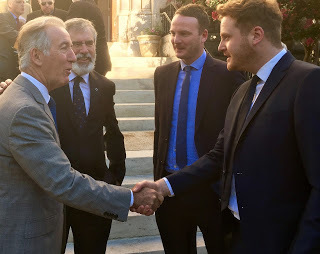
Congressman Richard Neal, Gerry Adams
and Fiachra and Emmett McGuinness For the second time this month I am in the United States of America. And not for the first time I am writing my weekly column on the train between Washington DC and New York. It’s a beautiful Tuesday evening as the train speeds its way through the American countryside. The sky is largely blue with some clouds rolling across it. RG and I travelled up to DC on Monday evening. Rita O’Hare had warned me to be prepared for hot weather. New York and DC have been experiencing a heat wave with temperatures in the 90’s. I was told that temperatures this week would be in the more ‘bearable’ 80’s. I had to keep telling my American friends that for Irish people temperatures in the 80’s are still a heat wave!As it turned out they were all wrong. The temperature in New York only climbed to the low 70’s and on Monday it rained most of the day. Just like an Irish summer!
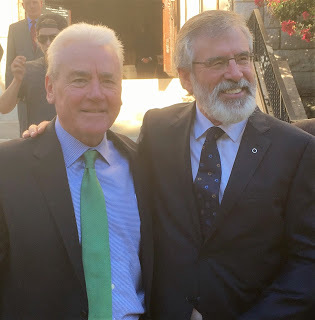 Terry O Sullivan and Gerry Adams
Washington was the polar opposite. The sky was blue. The heat was blistering. When RG and I arrived in DC we first travelled to the Du Pont Hotel for a brief meeting with the British Secretary of State James Brokenshire who is also in Washington to present the British version of the current impasse in the political process.This morning, Tuesday, there was a very nice memorial mass in St. Peter’s Church in DC for Martin McGuinness. It was a poignant affair organised by Congressman Richard Neal and some of his colleagues who have known Martin for many years and were deeply shocked by his death. Martin’s two sons Fiachra and Emmett travelled over from Derry to join us.
Terry O Sullivan and Gerry Adams
Washington was the polar opposite. The sky was blue. The heat was blistering. When RG and I arrived in DC we first travelled to the Du Pont Hotel for a brief meeting with the British Secretary of State James Brokenshire who is also in Washington to present the British version of the current impasse in the political process.This morning, Tuesday, there was a very nice memorial mass in St. Peter’s Church in DC for Martin McGuinness. It was a poignant affair organised by Congressman Richard Neal and some of his colleagues who have known Martin for many years and were deeply shocked by his death. Martin’s two sons Fiachra and Emmett travelled over from Derry to join us.
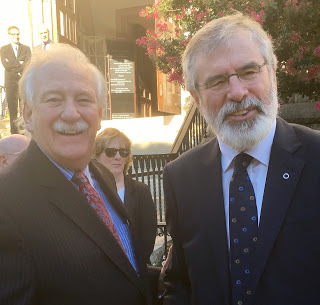 Bruce Morrison and Gerry Adams
After the mass I met with the Congressional Friends of Ireland Caucus on Capitol Hill. The Committee members have been good friends to Ireland and to the peace process going back over two decades. They share the understandable concern within Irish America about the failure to reach agreement in the recent negotiations around the restoration of the political institutions.There is also a real worry about the political and economic implications of Brexit and the detrimental effect that it is likely to have on the Good Friday Agreement.I made it clear to our American friends that Sinn Féin is committed to the re-establishment of the political institutions, but that they must be on a sustainable basis. The institutions have to work for everyone. That means they must serve all citizens. They must also be based on respect, integrity and equality. As Martin McGuinness said at the beginning of the year when he resigned; the status quo as it has existed is not acceptable.I reminded them that the Irish and British governments have a key role to play in re-establishing the institutions. Many of the rights issues that remain outstanding from the Good Friday and subsequent agreements are the responsibility of the two governments. That means progress must be made on Irish language rights, marriage equality, the Bill of Rights, legacy matters and anti-sectarian measures. So far, the DUP has resisted agreement on these fundamental matters that are essential for the political institutions to be sustainable.This is especially true of the British government and its refusal to honour its commitments on legacy issues. It has cynically used the excuse of ‘national security’ to frustrate the implementation of the Stormont House Agreement on legacy. In particular, the British government has denied the inquest courts and the Police Ombudsman’s office the funding they need to fulfill their legal responsibilities.The Lord Chief Justice, Declan Morgan, proposed a plan for dealing with the inquests relating to 97 deaths that have yet to take place. Many of these deaths go back decades. The McGurk bomb attack in December 1971 is just one example. 15 civilians were killed. 46 years there has been no inquest. Last November the families of the victims were told that a British Army file that could shed important light on what occurred will not be released until 2056. This is unacceptable. As part of its efforts to side-line legacy issues the British Secretary of State recently said that his government would now consult on the legacy proposals. Most victims’ groups are opposed to this. They believe it is a cynical ploy to delay, delay, delay, dealing properly with legacy. And they are right. While he is here the British Secretary of State James Brokenshire will meet with some of the Congressional leaders and I urged them to challenge him on these matters.I also reminded our Congressional friends that the second IRA cessation, which paved the way for the all-party talks that led to the Good Friday Agreement, took place 20 years ago this month. They and the Clinton Administration, and Irish America, played a pivotal role in helping to create the conditions for the cessation to happen. Despite the difficulties a lot of progress has been made in the two decades since and it is possible to make more if everyone committed to the Agreement stay focused on resolving the remaining issues that have given rise to the current difficulties.For this reason, we still need the support of Irish America and our friends on Capitol Hill, and their ability to influence US government policy as well as the Irish and British governments.Finally, our discussions touched on the issue of Brexit. The implications of Brexit and the likely imposition of a hard economic border on the island of Ireland, was very much on the minds of those Congressional leaders I met. Their concerns have been heightened following last week’s inconclusive Brexit negotiations between the EU and British government. Michel Barnier the EU’s Chief negotiator on Brexit warned that there are‘fundamental divergences’ between the British and EU. He also told journalists last Thursday July 20th that more detailed discussion is needed on how to protect the Good Friday Agreement and ‘in particular more work needs to be done to protect North-South co-operation.’I took the opportunity to set out our view that the best way to defend the Good Friday Agreement and to ensure that the two economies on the island of Ireland are protected is for the North to be designated special status within the EU. That is the only way to respect the majority vote in the north to remain.Following that meeting it was a working lunch with the State department and then a short taxi journey back to Union Station and the 4pm ACELA express to New York. It takes three hours but the train ride is generally smooth and it has provided the opportunity for me to scríobh (write) these few words. See you back home.
Bruce Morrison and Gerry Adams
After the mass I met with the Congressional Friends of Ireland Caucus on Capitol Hill. The Committee members have been good friends to Ireland and to the peace process going back over two decades. They share the understandable concern within Irish America about the failure to reach agreement in the recent negotiations around the restoration of the political institutions.There is also a real worry about the political and economic implications of Brexit and the detrimental effect that it is likely to have on the Good Friday Agreement.I made it clear to our American friends that Sinn Féin is committed to the re-establishment of the political institutions, but that they must be on a sustainable basis. The institutions have to work for everyone. That means they must serve all citizens. They must also be based on respect, integrity and equality. As Martin McGuinness said at the beginning of the year when he resigned; the status quo as it has existed is not acceptable.I reminded them that the Irish and British governments have a key role to play in re-establishing the institutions. Many of the rights issues that remain outstanding from the Good Friday and subsequent agreements are the responsibility of the two governments. That means progress must be made on Irish language rights, marriage equality, the Bill of Rights, legacy matters and anti-sectarian measures. So far, the DUP has resisted agreement on these fundamental matters that are essential for the political institutions to be sustainable.This is especially true of the British government and its refusal to honour its commitments on legacy issues. It has cynically used the excuse of ‘national security’ to frustrate the implementation of the Stormont House Agreement on legacy. In particular, the British government has denied the inquest courts and the Police Ombudsman’s office the funding they need to fulfill their legal responsibilities.The Lord Chief Justice, Declan Morgan, proposed a plan for dealing with the inquests relating to 97 deaths that have yet to take place. Many of these deaths go back decades. The McGurk bomb attack in December 1971 is just one example. 15 civilians were killed. 46 years there has been no inquest. Last November the families of the victims were told that a British Army file that could shed important light on what occurred will not be released until 2056. This is unacceptable. As part of its efforts to side-line legacy issues the British Secretary of State recently said that his government would now consult on the legacy proposals. Most victims’ groups are opposed to this. They believe it is a cynical ploy to delay, delay, delay, dealing properly with legacy. And they are right. While he is here the British Secretary of State James Brokenshire will meet with some of the Congressional leaders and I urged them to challenge him on these matters.I also reminded our Congressional friends that the second IRA cessation, which paved the way for the all-party talks that led to the Good Friday Agreement, took place 20 years ago this month. They and the Clinton Administration, and Irish America, played a pivotal role in helping to create the conditions for the cessation to happen. Despite the difficulties a lot of progress has been made in the two decades since and it is possible to make more if everyone committed to the Agreement stay focused on resolving the remaining issues that have given rise to the current difficulties.For this reason, we still need the support of Irish America and our friends on Capitol Hill, and their ability to influence US government policy as well as the Irish and British governments.Finally, our discussions touched on the issue of Brexit. The implications of Brexit and the likely imposition of a hard economic border on the island of Ireland, was very much on the minds of those Congressional leaders I met. Their concerns have been heightened following last week’s inconclusive Brexit negotiations between the EU and British government. Michel Barnier the EU’s Chief negotiator on Brexit warned that there are‘fundamental divergences’ between the British and EU. He also told journalists last Thursday July 20th that more detailed discussion is needed on how to protect the Good Friday Agreement and ‘in particular more work needs to be done to protect North-South co-operation.’I took the opportunity to set out our view that the best way to defend the Good Friday Agreement and to ensure that the two economies on the island of Ireland are protected is for the North to be designated special status within the EU. That is the only way to respect the majority vote in the north to remain.Following that meeting it was a working lunch with the State department and then a short taxi journey back to Union Station and the 4pm ACELA express to New York. It takes three hours but the train ride is generally smooth and it has provided the opportunity for me to scríobh (write) these few words. See you back home.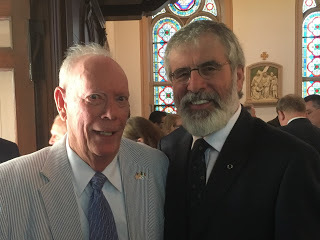 Jack O Brien and Gerry Adams
Jack O Brien and Gerry Adams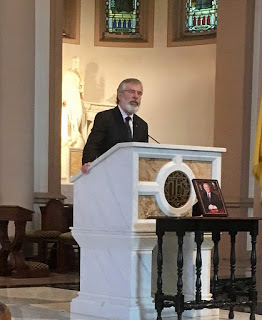 Speaking at the Memorial Mass for Martin McGuinness
Speaking at the Memorial Mass for Martin McGuinness
Published on July 30, 2017 08:26
July 20, 2017
The challenge facing Fianna Fáil
20 years ago this month the IRA declared its second cessation. As a result of that historic initiative all-party negotiations commenced in September 1997. After eight months of difficult negotiations the Good Friday Agreement was agreed on April 10th 1998.The Agreement is an historic compromise between nationalists, unionists, republicans, and the British and Irish governments. It is not the republic proclaimed at Easter 1916 but it is based on the principles of equality and respect, and parity of esteem, and provides a route to further progress towards our republican objectives. The Good Friday Agreement has been described as an agreement to a journey but not to a destination. It moved beyond notion of an internal 6 county settlement. It is all-Ireland, in form and structure. It is about a new political dispensation on the island of Ireland and a new relationship between Ireland and Britain. It is also about fundamental constitutional and institutional change.
In essence, the Good Friday Agreement is about establishing a level playing field which provides an opportunity for unionists to present their case in support of the union, and for nationalists and republicans to present our case for a United Ireland. Recognising that the constitutional or national question is yet to be resolved the Agreement specifically states that “if, in the future, the people of the island of Ireland exercise their right of self-determination on the basis set out in sections (i) and (ii) above to bring about a united Ireland, it will be a binding obligation on both Governments to introduce and support in their respective Parliaments legislation to give effect to that wish.”
So there you have it. For nationalists and republicans and democrats who seek to achieve a united Ireland our task must be about persuasion. If we are serious about a united Ireland then we have to agree strategies that promote it. We have to present convincing and cogent arguments in favour of Irish unity. And we have to engage with unionism and seek to persuade a section of that part of our society to support Irish unity.
At first glance agreeing the means by which the people of Ireland, north and south, can exercise our right to self-determination should be relatively straightforward. Most parties on this island say they are for Irish unity. Since partition the establishment political parties in the 26 counties have consistently promoted themselves and their policies as ‘republican’ and their desire for Irish unity being their primary objective. Fianna Fáil is ‘The Republican Party’; Fine Gael is the ‘United Ireland Party’; and Labour claim ownership of the Connolly tradition.
The reality, of course, has been very different. Their focus has been on the competing demands of electoral politics within the southern state. At differing times, usually when there is an election, they have wrapped the green flag round themselves because they know that Irish unity is popular.Last year’s centenary celebrations for the 1916 Easter Rising were evidence of this. The vast majority of Irish people at home and abroad proudly celebrated the Rising and the Proclamation of the Republic. One result of this, and of the two elections in the North this year, and the dire consequences of Brexit, has been an increase in the debate around Irish unity. Late last year Sinn Fein produced a discussion paper on this. Others have produced detailed economic papers on the benefits of unity. In January in the Mansion House in Dublin and last month in the Waterfront Hall in Belfast Sinn Féin also held two very successful conferences discussing the future of Ireland and the potential for Irish unity. This year also saw former Taoiseach Enda Kenny commit to holding a referendum on voting rights for Presidential elections for citizens in the North and within the Irish diaspora. The European Union has also said that following Brexit, and in the event of Irish reunification, the North would automatically become a member of the EU.
These developments and the triggering of Article 50 by the British Prime Minister, Theresa May, for the commencement of negotiations on Brexit, has also changed the political climate in which the debate on Irish unity is now taking place.
In April I wrote to the leaders of the political parties in the Dáil about the possibility of establishing an all-party Oireachtas Committee on Irish unity. As Oireachtas members TDs and Seanadóirí have the right to establish Committees to assist in formulating legislative and political work that impact on people’s daily lives and the future direction of our county.
On that basis I proposed the establishment of an Oireachtas Committee on Irish Unity that would bring forward proposals for what a united Ireland might look like, how we get there and how the Irish State needs to plan for reunification across all areas of the economy and society. The committee would provide a forum where party political interests could be left at the door and where the idea of a broad consensus for Irish Unity could be nurtured.
I pointed out that the cause of uniting Ireland is not the property of any one grouping or party and that consequently it is crucial that we leave party political and electoral interests at the door and embrace the idea of a broad consensus and civic movement for Irish Unity. The campaign for Irish Unity should be accessible to all and exclude nobody.
Crucially, part of the work of the Committee would be to put in place a vision for the future of the island that assures Unionists of their place in a New Ireland. It could also consider the circumstances in which a referendum on unity would be held and how it could be won. I submitted for their consideration a draft of such a Committee’s Orders of Reference, though obviously these can be amended and shaped as desired on a consensus basis.
I have yet to receive a response from the Taoiseach Leo Varadkar or from the leader of the Labour Party Brendan Howlin. However, the Fianna Fail leader Micheál Martin has refused to support the establishment of an Oireachtas Committee. His excuse is that Fianna Fáil is committed to “working within the framework of the Good Friday Agreement and procedurally through the Oireachtas Committee on the implementation of the Good Friday Agreement.”
But the Oireachtas Committee on the Implementation of the Good Friday Agreement is about cross border co-operation. It is not about Irish unity. The Good Friday Agreement has a specific commitment to the holding of a referendum on Irish unity. The Fianna Fáil leader is against this. This stance of Micheál Martin is very disappointing. He needs to get serious about a United Ireland.
The reality is that an agreed Ireland is not inevitable. It has to be worked for. It will not happen by accident. It has to be planned for. Nationalists and republicans have to work together towards the development of a broad civic movement for Irish Unity. We have to reach out to unionists. The establishment of an Oireachtas Committee would advance these objectives by helping in the formulating of legislative and political work that impact on the future direction of our county.
There are no short cuts to Irish unity. It is a huge challenge for those of us who want to go beyond the rhetoric of a united Ireland to the actual achievement of that objective. That is the challenge facing Fianna Fáil. And the rest of us.
DRAFT ORDERS OF REFERENCE FOR OIREACHTAS COMMITTEE ON IRISH UNIFICATION
"That, notwithstanding anything in Standing Orders, Dáil Éireann— recognises:— the cross-community, all-island support for the Good Friday Agreement, as endorsed collectively in referenda by the people of Ireland, north and south, on the 22nd May 1998;— the political, economic, social and cultural progress brought about by the peace process and the Agreement, benefiting all the people of Ireland; — the important work undertaken by the North-South Ministerial Council and by the North-South Implementation Bodies under the terms of the Agreement; and—in accordance with the Agreement, that it is the firm will of the Irish nation, in harmony and friendship, to unite all the people who share the territory of the island of Ireland,resolves:— to promote all-Ireland policies and strategies, benefiting all parts of the island of Ireland;— to actively seek to persuade all those who share the island of Ireland, through dialogue, of the advantages of Irish unification; and— to prepare politically, economically, socially and culturally for Irish unification, identify steps and measures, including the preparation of a report, which can assist a successful transition to a united Ireland,orders that:(a) a Special Committee (hereinafter referred to as ‘the Committee’) is hereby appointed, to be joined with a Special Committee to be appointed by Seanad Éireann, to form the Joint Committee on Irish Unification;(b) the Committee shall present a report, with recommendations, to both Houses of the Oireachtas, in accordance with paragraphs (j) and (k);(c) the number of members of the Committee shall not exceed 14, and the members shall be appointed as follows:(i) four members shall be appointed by the Government, (ii) three members appointed by Fianna Fáil, (iii) two members appointed by Sinn Féin, and(iv) one member each appointed by the Labour Party, Solidarity—People Before Profit, Independents4Change, the Rural Independent Group and the Social Democrats—Green Party Group;(d) the Ceann Comhairle shall announce the names of the members appointed under paragraph (c) for the information of the Dáil on the first sitting day following their appointment;(e) the quorum of the Joint Committee shall be seven, at least one of whom shall be a member of the Dáil, and one a member of the Seanad;(f) the Joint Committee shall have the powers defined in Standing Order 85(1), (2), (3), (4), (5), (7), (8) and (9); (g) Members of the Westminster Parliament elected from constituencies in Northern Ireland may attend meetings of the Joint Committee and of its sub-Committees and may take part in proceedings without having a right to vote or to move motions and amendments;(h) the Chairman of the Joint Committee shall be a member of Dáil Éireann;(i) the Committee shall be mandated to hold hearings in public with expert witnesses; invite and accept written submissions;(j) the Committee shall, within six months of its initial meeting, present a final report to both Houses of the Oireachtas, for earliest possible discussion in both Houses; (k) the Committee’s final report shall examine and identify the benefits of Irish unification, make recommendations to overcome obstacles to unification and develop a plan to achieve Irish unification, in line with the objectives of:(i) promoting all-Ireland policies and strategies, benefiting all parts of the island of Ireland,(ii) seeking to persuade all those who share the island of Ireland, through dialogue, of the advantages of Irish unification,(iii) preparing politically, economically, socially and culturally for Irish unification,(iv) identifying steps and measures which can assist a successful transition to a united Ireland;(i) the Committee shall produce an interim report, containing also its proposed work schedule, to be debated at a meeting of the Dáil no less than one month, and no more than two months, after its establishment; and(m) the Committee shall meet as frequently as appropriate to fulfil its remit.”
Published on July 20, 2017 08:41
July 15, 2017
GAA thriving in the USA
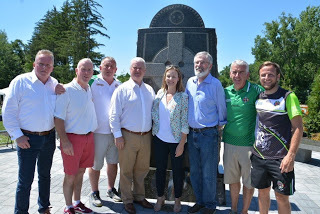 The Great Hunger memorial at Rockland GAC
Rita O Hare says she doesn't understand sports. "A load of balls" says she in a dismissive tone when the subject comes up. So, she didn't really show any interest when I tried to keep up with the Lions versus the All Blacks as we departed from Dublin Airport for the USA last Saturday morning. Later when we got to our hotel, The Time NYACK in Rockland county in the Hudson River Valley, she feigned complete disinterest in my efforts to keep track of the hurling and football Championship play offs back home.
The Great Hunger memorial at Rockland GAC
Rita O Hare says she doesn't understand sports. "A load of balls" says she in a dismissive tone when the subject comes up. So, she didn't really show any interest when I tried to keep up with the Lions versus the All Blacks as we departed from Dublin Airport for the USA last Saturday morning. Later when we got to our hotel, The Time NYACK in Rockland county in the Hudson River Valley, she feigned complete disinterest in my efforts to keep track of the hurling and football Championship play offs back home. Me? I was keeping my commitment to Claire Kerraine to support Roscommon against Galway in the Connacht Football Final. I’m a big fan of Galway but given that they are doing so well with the hurling I succumbed to Claire's faith in her heroes and opted for the Rossies. And I'm glad I did. What a win! And then the hurling thriller at Thurles when Waterford and Kilkenny were neck to neck at half time. The Déise went on to victory in extra time. What a game! Same buzz on Sunday when Cork overpowered Clare. I like Clare hurling but the Rebel county out hurled them. I followed all these games on social media in upstate New York. Rita was oblivious to it all.
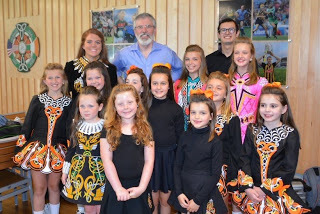 But even she was impressed when we got to Rockland Gaelic Athletic Club's grand opening of their new club rooms. They are situated in the rural green rolling countryside of Pearl River and Orangeburg, an hour plus outside New York City. The club is a hub for the Gaeldom in that community. It has been years in the planning and two years in construction. It began with some of the club members putting up their homes as collateral for the loan needed to begin work. In April 2015, the construction began and just over two years later the clubhouse has been completed. On the upper floor of this two-storey building is a large community hall which spreads out into a canopied pavilion. From there you have a clear view across the upper and lower pitches. The clubrooms include locker rooms, showers and all of the facilities you would expect in a modern GAA club for players and members alike.I was in Pearl River before. At the Saint Patrick's Day Parade many moons ago. Another memorable occasion. I was the guest of the late Congress Member Ben Gilman. This time I was the guest of Cormach Murrihy, his wife Vivian and their children Cain and Caoimhe. Cormach is a stalwart Gael and upright citizen from that parish. The new club rooms would grace any Gaelic grounds anywhere. Facing on to the playing field the seated area was bunged with Gaels of all shapes and sizes. A live band pumped out Irish ballads. County geansais (jerseys) competed also in the jersey stakes. O Neill tops were omnipresent. And there were children everywhere. Camógs and footballers swarmed in perpetual games on the pitch. Junior teams vied with one and other. The craic was ninety. The warm July sun shone brightly over us all from a clear blue sky.
But even she was impressed when we got to Rockland Gaelic Athletic Club's grand opening of their new club rooms. They are situated in the rural green rolling countryside of Pearl River and Orangeburg, an hour plus outside New York City. The club is a hub for the Gaeldom in that community. It has been years in the planning and two years in construction. It began with some of the club members putting up their homes as collateral for the loan needed to begin work. In April 2015, the construction began and just over two years later the clubhouse has been completed. On the upper floor of this two-storey building is a large community hall which spreads out into a canopied pavilion. From there you have a clear view across the upper and lower pitches. The clubrooms include locker rooms, showers and all of the facilities you would expect in a modern GAA club for players and members alike.I was in Pearl River before. At the Saint Patrick's Day Parade many moons ago. Another memorable occasion. I was the guest of the late Congress Member Ben Gilman. This time I was the guest of Cormach Murrihy, his wife Vivian and their children Cain and Caoimhe. Cormach is a stalwart Gael and upright citizen from that parish. The new club rooms would grace any Gaelic grounds anywhere. Facing on to the playing field the seated area was bunged with Gaels of all shapes and sizes. A live band pumped out Irish ballads. County geansais (jerseys) competed also in the jersey stakes. O Neill tops were omnipresent. And there were children everywhere. Camógs and footballers swarmed in perpetual games on the pitch. Junior teams vied with one and other. The craic was ninety. The warm July sun shone brightly over us all from a clear blue sky.
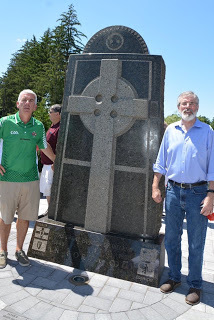 GAA Aogán Ó Fearghaíl was there to do the official opening. He had flown in from Argentina where he assured us Gaelic games are thriving. He too was impressed by Rockland GAC. The new facilities there are a tribute to the spirit of volunteerism and community that is the essence of An Cumann Luthcleas Ghael. I spoke to many of the Club Officers all of who gave credit to Brian Pearson who ramrodded the building of the club rooms. The Woods brothers played their part also so did Mick Healy. And big Jimmy O’Sullivan who literally poured the foundations. His father taught him all he knows. They could rebuild Casement Park on their own. Founding member John Cawley started the whole thing off a long time ago. Hard work, commitment, perseverance and vision paid off. Everyone deserves credit. From Committee members to builders, mentors, players, those who maintain the pitches and mark it out.
GAA Aogán Ó Fearghaíl was there to do the official opening. He had flown in from Argentina where he assured us Gaelic games are thriving. He too was impressed by Rockland GAC. The new facilities there are a tribute to the spirit of volunteerism and community that is the essence of An Cumann Luthcleas Ghael. I spoke to many of the Club Officers all of who gave credit to Brian Pearson who ramrodded the building of the club rooms. The Woods brothers played their part also so did Mick Healy. And big Jimmy O’Sullivan who literally poured the foundations. His father taught him all he knows. They could rebuild Casement Park on their own. Founding member John Cawley started the whole thing off a long time ago. Hard work, commitment, perseverance and vision paid off. Everyone deserves credit. From Committee members to builders, mentors, players, those who maintain the pitches and mark it out.
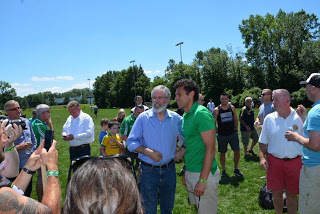 Vincent Tyer was delighted with the huge turn out and the excitement of it all. And Vince had another surprise for me. He presented me with a proclamation designating July 9th in Orangetown, where the Rockland County GAC is situated, as Gerry Adams Day. It was a great honour. I bumped into old friends at every turn. Mattie Reilly and his family. Mike McGinley and his clann. Thirty former footballing All Stars had flown in from Ireland to play a special game on Sunday evening. They included Peter Canavan, Oisín McConville, Paddy Bradley and Graham Geraghty. There were players from Derry, Monaghan, Tyrone, Armagh, Down and Donegal, from Wexford and Meath and Kilkenny, from Sligo and Mayo and Galway and Cork. A warm go raibh maith agaibh to Paul Rowley and Marty McKenna who showed me around the Clubrooms and to Georgina Boyle the architect.
Vincent Tyer was delighted with the huge turn out and the excitement of it all. And Vince had another surprise for me. He presented me with a proclamation designating July 9th in Orangetown, where the Rockland County GAC is situated, as Gerry Adams Day. It was a great honour. I bumped into old friends at every turn. Mattie Reilly and his family. Mike McGinley and his clann. Thirty former footballing All Stars had flown in from Ireland to play a special game on Sunday evening. They included Peter Canavan, Oisín McConville, Paddy Bradley and Graham Geraghty. There were players from Derry, Monaghan, Tyrone, Armagh, Down and Donegal, from Wexford and Meath and Kilkenny, from Sligo and Mayo and Galway and Cork. A warm go raibh maith agaibh to Paul Rowley and Marty McKenna who showed me around the Clubrooms and to Georgina Boyle the architect.
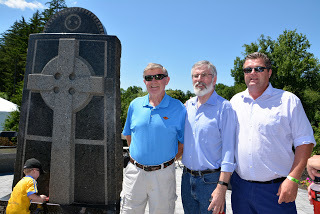 With Jimmy Snr and Jimmy Jnr O'Sullivan
Someone had heard of my prowess and success as a leading competitor in the west Belfast Féile an Phobail Poc Fada and press ganged me into their Poc Fada contest. Me against All Stars, Cork’s Seán Óg O’hAlpáin and Martin and Andy Comerford from Kilkenny. Between us we had twelve All Ireland medals. Jimmy O Flynn and Kevin McKay joined us. One of them, a Carnlough man won the Poc Fada. I softened the opposition up for him. Antroim Abú.
With Jimmy Snr and Jimmy Jnr O'Sullivan
Someone had heard of my prowess and success as a leading competitor in the west Belfast Féile an Phobail Poc Fada and press ganged me into their Poc Fada contest. Me against All Stars, Cork’s Seán Óg O’hAlpáin and Martin and Andy Comerford from Kilkenny. Between us we had twelve All Ireland medals. Jimmy O Flynn and Kevin McKay joined us. One of them, a Carnlough man won the Poc Fada. I softened the opposition up for him. Antroim Abú.
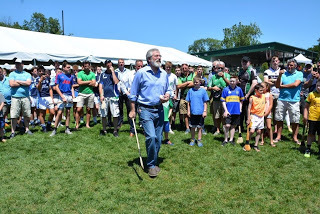 All in all it was a great weekend. The GAA at its best. The Diaspora united in its vibrant brightest colours. Hot wired into our culture and Gaelic games. Connected to home. Patriots all. Rita relented at the end. 'But that's more than sport' she said 'It’s part of what we are'. Rita is right. As usual.
All in all it was a great weekend. The GAA at its best. The Diaspora united in its vibrant brightest colours. Hot wired into our culture and Gaelic games. Connected to home. Patriots all. Rita relented at the end. 'But that's more than sport' she said 'It’s part of what we are'. Rita is right. As usual. 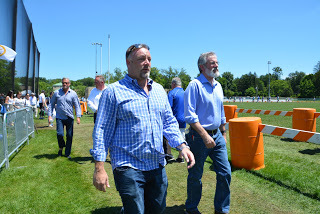 Mise agus Cormach with Joseph Smith and Vincent Tyer behind
Mise agus Cormach with Joseph Smith and Vincent Tyer behind
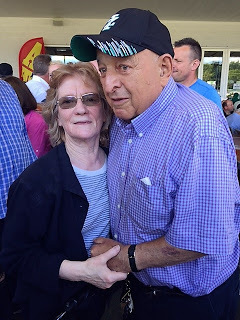
Published on July 15, 2017 06:39
July 7, 2017
There can be no return to the status quo
The anti-equality approach of the DUP, supported by the British government, has seen the shutters effectively pulled down on this round of talks. This constitutes a monumental failure by Theresa May and her government. Decades of work are being put on hold to keep her in power. As a result it is unlikely that any agreement will now be possible this side of the summer. None of this is surprising. The character of the current negotiations has been different from others we have had with the DUP in recent years. We were back to the David Trimble style of slow, tedious, minimalist negotiations. As a consequence, there was no agreement on Irish language rights, marriage equality, the Bill of Rights, legacy matters or anti-sectarian measures. The DUP has resisted the imperative of rights-based policies and agreements that are essential for the political institutions to be sustainable. This is especially true in the context of Brexit, the DUP alliance with the Tories and the fallout from the RHI scandal.Contrary to claims by the British Secretary of State James Brokenshire that good progress was made the fact is that no substantive movement was achieved on the core issues. Once again a British government has pandered to the DUP’s anti-rights, anti-equality agenda. This tacit endorsement of the DUP’s stance has been driven in large part by Theresa May’s desire to stay in power. The British Prime Minister is backing the denial of basic rights here which are the norm in England, Scotland, Wales and the rest of Ireland, That cannot be tolerated.
During this process some elements of the media and of the political establishments, north and south, tried to pressurize Sinn Féin into acquiescing to discrimination. We refused. The Irish Times editorial last Saturday is a case in point. It called on the ‘two big parties in Northern Ireland to show they are serious about politics by striking a deal that will enable the powersharing institutions to be restored.’ What did they think Sinn Fein was trying to do?
The shallowness of their analysis is further evident in the line which states; ‘What divides the two parties appears more symbolic than real.’ There is nothing symbolic about marriage equality. The Irish Times editorialized in support of same sex marriage three days before the historic vote in that part of the island in May 2015. Its banner slogan says it all: ‘Marriage referendum: In the name of equality’. And it was right. Marriage equality was and is about equality, and it is important both for those citizens directly affected by it and for a society that seeks to be inclusive and non- discriminatory.
So, the Irish Times has no difficulty recognising the historic importance of the marriage equality vote for the South and for the rights of citizens who live there. Does it then believe that citizens who want to be married in this part of the island should be treated differently; should be denied equality? On Saturday Michelle O’Neill and I joined thousands of citizens in Belfast City Centre demanding marriage equality. They packed the streets around the City Hall. They made their demand for equality loud and clear. It is unacceptable that this is the only place in these islands that citizens do not have the right to marriage equality. It becomes even more unacceptable as the tide of history moves forward in support of same sex marriage, as was evident in the vote the previous day by the German Parliament. Marriage equality is only one of the rights based issues that are at the heart of the current difficulties. An Irish Language Act is another. Irish language rights are a central part of the Good Friday Agreement and Acht na Gaeilge is a part of the 2006 St. Andrew’s Agreement. This issue has both practical and symbolic importance. As was evident in the Assembly and Westminster votes there are many citizens who do not speak Irish but who believe that those citizens who wish to should have the protection of the law. Sinn Féin also has concerns about the way in which the DUP has used the Petition of Concern (PoC) and other legal instruments to block agreements signed by all of the parties, including the Irish and British governments. The Petition of Concern was introduced after the Good Friday Agreement in 1998. It means that a contentious piece of legislation can be blocked if 30 MLAs sign a petition of concern. Given the discriminatory history of the northern state the PoC was intended to prevent political and religious discrimination from occurring again. However, with the DUP holding more than 30 seats in the previous two Assembly periods they have been able to use it to block, for example, marriage equality legislation. Even though the majority of MLAs support marriage equality. In my last column, and in my Waterfront Hall speech at the recent conference on a United Ireland, I acknowledged the deep chasm that exists in this state since partition. The division between the nationalist and unionist position goes beyond the national question. It’s also about the right of those citizens in the North who embrace their sense of Irishness. Whether this is in music or literature, in language or sport or politics, or in their sense of history and family roots, there is a significant section of opinion in the North which is Irish and is proud to be Irish. There comes a point when you have to take a stand against injustice. Martin McGuinness made that clear on January 9th when, despite being gravely sick from an illness that would shortly after take his life, he travelled to Stormont to resign as Deputy First Minister. Speaking to the media Martin said: ‘There will be no return to the status quo. The situation we have been dealing with the course of recent years is unacceptable. I have called a halt to DUP arrogance and if the DUP think in the aftermath of an election that they are going to step back into Ministerial positions, short of resolving the critical issues IO have identified, then they are living in a fools paradise.’ Let me be equally clear. There can be no return to the status quo. Measures to resolve all of the issues at the heart of this crisis were agreed previously. We expect these to be implemented and the rights of citizens in the North to be acknowledged and respected. We also expect, as a result of the Renewable Heat Incentive scandal that integrity and transparency in government will now be agreed by all of the parties. Equality, rights and respect are the only basis for sustainable institutions.
The reality is that the Sinn Féin electorate will not consent to be governed by the DUP on their terms. We do not and would not expect the DUP electorate to consent to be governed by us on Sinn Féin terms. So it’s really quite simple. It’s all about rights. It’s about equality. Equality is good for everyone. It’s all about agreement and how these rights are going to be delivered. That’s the only way to get the institutions back in place. We have told that very directly to the DUP. We have said the same thing to the British Government. Mrs May is prepared to tolerate the denial of rights here which are enjoyed everywhere else on these islands. That is not acceptable to us. It should not be acceptable to anyone else and we look especially to the Taoiseach to make this clear to Theresa May.
Published on July 07, 2017 17:22
June 22, 2017
Any threat to Good Friday Agreement will be opposed
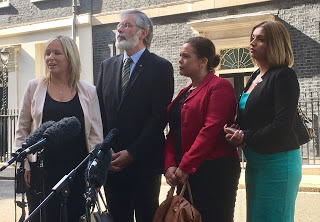
Last Thursday’s visit to London for a meeting with the British Prime Minister Theresa May was my first without Martin McGuinness. I was very mindful of that as Mary Lou, RG and I boarded the Aer Lingus flight in Dublin that morning. I was equally conscious of this because Thursday was the day that the Rev. Jesse Jackson was in Derry to officially open the Bloody Sunday museum with Martin’s son Fiachra, and to visit Martin’s grave.
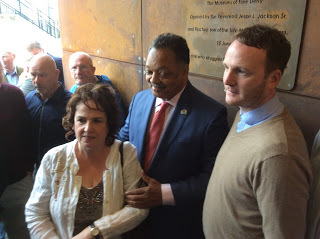 Bernie McGuinness with Jesse Jackson and her son Fiachra
Bernie McGuinness with Jesse Jackson and her son Fiachra
Despite the recent attacks in London and Manchester the streets around Westminster were packed with people, including many who were obviously tourists, enjoying the bright sunshine and the sights. The attacks have added a new edge to the area around Britain’s Parliament Buildings and Whitehall. There are many more visible and heavily armed police officers and police vehicles. There are also a formidable series of heavy metal barriers at major road junctions that can be moved into place with the clear purpose of sealing the centre of London off in an emergency.
The newspapers, television news and social media, were dominated by the horrific scenes from the catastrophic fire at the Grenfell block of flats the previous day. As we arrived into London Theresa May was visiting the scene of the disaster but twitter was already carrying reports quoting local people angry at her for not meeting grieving families, residents and survivors. Jeremy Corbyn, who also visited the scene, was being widely praised for his compassionate engagement with ordinary citizens and his obvious empathy at their plight.
As the media fallout continued it emerged that a year and a half ago the Tories voted against a Labour amendment to the Housing and Planning Bill which would have made it a requirement for landlords to ensure that any homes they are renting should be fit for human habitation. The Tory legislation, which was eventually passed with the support of DUP MPs, was part of a process of deregulation which is being viewed by many as contributing to the Grenfell fire.
The fire came on the back of a bad couple of weeks for the Tories. Theresa May had called her snap election believing she would win more seats. Having promised ‘strong and stable’ government Mrs May returned with less MPs and her own status as Tory leader and Prime Minister severely weakened. She immediately turned to the DUP and its ten MPs to provide a ‘confidence and supply’ arrangement to sustain her government in power. The reaction from the media in Britain was one of almost universal shock. The record of the DUP and its homophobic, sectarian, ultra conservative, anti-climate change and creationist philosophy became front page news and dominated social media.
The implications for the peace process, the Good Friday Agreement and the current talks to restore the political institutions were at the top of our agenda when we met the British Prime Minister in the Cabinet Office. Mary lou, RG and I were joined by Michelle O’Neill, our new MP for Foyle Elisha McCallion and Stephen McGlade.
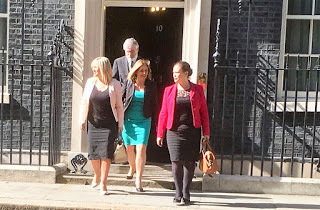 I opened our contribution by offering our sympathy at the loss of life in the Grenfell tragedy. I then proceeded to set out the context for the current crisis in the political institutions in the North, including the Renewable Heat Incentive scandal and the allegations from within the DUP of corruption. I handed the Prime Minister a copy of Martin McGuinness’s resignation letter. It succinctly explains the issues behind the crisis, including the years of disrespect and obstruction within the institutions by the DUP.Michelle and I both bluntly told Mrs May, James Brokenshire, the British Secretary of State, and their officials that the British government is in default of the Good Friday Agreement. We told her that in our view the government and the DUP have refused to implement key agreements on language and equality rights and dealing with the legacy of the past. I told Mrs May that there could be no deal without a stand-alone Irish Language Act based on best international protocols for indigenous languages. The British side voiced the usual clichés about wanting to encourage the parties to reach a deal but we told them that the issues at the heart of the crisis are not simply Sinn Féin issues or DUP issues. Equality, Irish language rights, marriage equality, the Bill of Rights are all British government issues and Irish government issues also, and they have to meet their obligations.
I opened our contribution by offering our sympathy at the loss of life in the Grenfell tragedy. I then proceeded to set out the context for the current crisis in the political institutions in the North, including the Renewable Heat Incentive scandal and the allegations from within the DUP of corruption. I handed the Prime Minister a copy of Martin McGuinness’s resignation letter. It succinctly explains the issues behind the crisis, including the years of disrespect and obstruction within the institutions by the DUP.Michelle and I both bluntly told Mrs May, James Brokenshire, the British Secretary of State, and their officials that the British government is in default of the Good Friday Agreement. We told her that in our view the government and the DUP have refused to implement key agreements on language and equality rights and dealing with the legacy of the past. I told Mrs May that there could be no deal without a stand-alone Irish Language Act based on best international protocols for indigenous languages. The British side voiced the usual clichés about wanting to encourage the parties to reach a deal but we told them that the issues at the heart of the crisis are not simply Sinn Féin issues or DUP issues. Equality, Irish language rights, marriage equality, the Bill of Rights are all British government issues and Irish government issues also, and they have to meet their obligations.
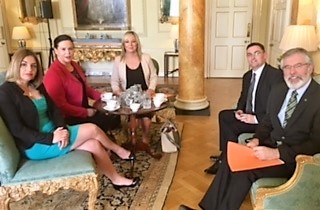 Michelle O’Neill challenged Mrs May on austerity, the one billion cut from the North’s budget and argued for funding for public services and capital projects. With the Brexit negotiations due to commence on Monday we also raised the imposition of Brexit, against the will of the people of the North who voted against it. Mrs May repeated the meaningless rhetoric about not wanting a return to the borders of the past . We urged her to look at Sinn Féin’s proposal for designated status for the North within the EU. It is a proposal that would not impinge on the constitutional status of the North.We warned Prime Minister May that doing a deal with the DUP in order to hold on to power carried with it huge risks. Sinn Féin will oppose any pact that undermines the Good Friday Agreement and we will look to the new Taoiseach to oppose it also as a co-guarantor of the Agreement. In her contribution Mary Lou Our referenced the demographic changes that are taking place in the North and the increased interest in Irish unity. We told Mrs May that a referendum on Irish unity is inevitable and that she and her government had to prepare for it.At the same time, we made it clear that our objective in the talks is to reach an agreement with the DUP and the other parties on restoring the institutions. But this will only happen if they are sustainable, viable and properly resourced. That means resolving all of the outstanding issues, and the British government providing a financial package that addresses the austerity cuts to the block grant that the Cameron and May governments have been responsible for.
Michelle O’Neill challenged Mrs May on austerity, the one billion cut from the North’s budget and argued for funding for public services and capital projects. With the Brexit negotiations due to commence on Monday we also raised the imposition of Brexit, against the will of the people of the North who voted against it. Mrs May repeated the meaningless rhetoric about not wanting a return to the borders of the past . We urged her to look at Sinn Féin’s proposal for designated status for the North within the EU. It is a proposal that would not impinge on the constitutional status of the North.We warned Prime Minister May that doing a deal with the DUP in order to hold on to power carried with it huge risks. Sinn Féin will oppose any pact that undermines the Good Friday Agreement and we will look to the new Taoiseach to oppose it also as a co-guarantor of the Agreement. In her contribution Mary Lou Our referenced the demographic changes that are taking place in the North and the increased interest in Irish unity. We told Mrs May that a referendum on Irish unity is inevitable and that she and her government had to prepare for it.At the same time, we made it clear that our objective in the talks is to reach an agreement with the DUP and the other parties on restoring the institutions. But this will only happen if they are sustainable, viable and properly resourced. That means resolving all of the outstanding issues, and the British government providing a financial package that addresses the austerity cuts to the block grant that the Cameron and May governments have been responsible for. As I write these few words there is still no clarity around the DUP and Tory pact. The Brexit negotiations have begun and the talks to restore the institutions have recommenced following the Westminster election. With the June 29th deadline next week and the marching season about to kick-off there is only a short window to agree a restoration of the institutions.
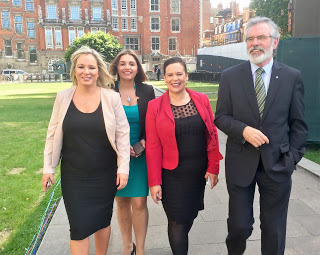
Published on June 22, 2017 06:27
Gerry Adams's Blog
- Gerry Adams's profile
- 29 followers
Gerry Adams isn't a Goodreads Author
(yet),
but they
do have a blog,
so here are some recent posts imported from
their feed.



